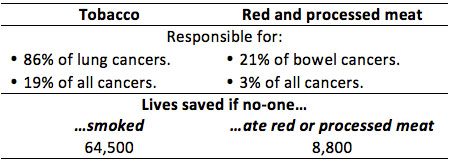The media loves a good headline, and the World Health Organisation (WHO) and the International Agency for Research on Cancer (IARC) provided the perfect story on October 26th – processed meat causes cancer. So is bacon the new tobacco?
The review of over 800 studies found conclusive evidence that processed meats cause colorectal cancer, placing them into the AICR’s top category for carcinogenic substances alongside tobacco. Strong associations were also found for stomach cancer. Red meat was classified as ‘probably causing’ colorectal cancer with the working group unable to exclude all other confounding factors from the data available.
So, are sausages and bacon as bad for us as smoking? Comparing the lowest with the highest consumers, the evidence concluded that for every 50g of processed meat consumed a day, the relative risk of colorectal cancer increased by 18% and for every 100g of red meat consumed daily, the risk increased by 17%.
However, when the findings are put into perspective, it is clear that the level of damage caused by smoking is far greater. The IARC, highlights that their findings and risk categories reflect how strong the scientific evidence is for a substance to cause cancer rather than how many incidences of cancer it will actually cause.
Cancer Research UK’s (CRUK) blog on this topic puts things into perspective:
- 61 out of 1,000 people are expected to develop bowel cancer.
- For the lowest meat consumers, this risk will be lower, at around 56 per 1,000.
- For processed meat consumers with a 17% increased relative risk, the incidence would therefore be 66 per 1,000, i.e. 10 more cases per 1,000 for processed vs. non-processed meat consumers.
CRUK went on to put the risk in more real terms.
It’s not about the quality of the meat – it’s all in the cooking or processing technique! The mechanism by which red meat and processed meat cause cancer is still being investigated. However, the current evidence points towards the method of processing and cooking as key drivers for production of carcinogens and there seems little impact with regard to the quality or cut of meat. Processed meats include ancient traditions of smoking, curing and salting as well as any other process to enhance the flavour or shelf life of meat. Included in this category are ham, sausages, bacon, tinned meat and sausages. It is thought that the processing results in the formation of carcinogens within the meat such as N-nitroso-compounds (NOC) and polycyclic aromatic hydrocarbons (PAH).
Get the slow cooker out to help reduce cancer risk! For red meat, which includes pork, beef, lamb and goat, it is the cooking of the meat that seems to generate carcinogenic compounds such as heterocyclic aromatic amines (HAA) and PAH. And these carcinogens like higher temperatures such as those produced during pan frying, grilling and barbecuing.
So how much is too much? On this, there is less clarity as the evidence did not indicate to a ‘safe’ level. CRUK recommends following the current guidelines of no more than 70g red meat per day, avoid processed meat and to use more plant-based protein foods to part or fully replace meat dishes.
How much processed and red meat is the UK currently eating? According to the NDNS data, men eat an average of 86g per day and women 56g. However, there is a significant range from zero for non-meat eaters up to 219g daily for some men. Focusing on the higher processed meat consumers and identifying effective behaviour change strategies seems to be key.
What should our advice be to consumers? Although the Atkin’s supporters may be a little displeased, the average consumer and the press cannot blame scientists and health professionals for always changing their minds. The advice is the same as always…a varied balanced diet, cutting down on red meat and trying to avoid processed meat.
References
- Chan DSM, Lau R, Aune D et al. Red and processed meat and colorectal cancer incidence: meta-analysis of prospective studies. PLoS ONE 6(6): e20456. doi:10.1371/journal.pone.0020456. http://journals.plos.org/plosone/article?id=10.1371/journal.pone.0020456 accessed 5th Nov.
- Bouvard V, Loomis D, Guyton KZ et al. (International Agency for Research on Cancer Monograph Working Group). Carcinogenicity of consumption of red and processed meat. Lancet Oncol. 2015 Oct 23. pii: S1470-2045(15)00444-1. doi: 10.1016/S1470-2045(15)00444-1. [Epub ahead of print] http://www.thelancet.com/journals/lanonc/article/PIIS1470-2045(15)00444-1/abstract Accessed 5th November.
- Dunlop C. Cancer Research UK Science Blog. Processed meat and cancer – what you need to know. 26 October 2015. http://scienceblog.cancerresearchuk.org/2015/10/26/processed-meat-and-cancer-what-you-need-to-know/ Accessed 5th November.

